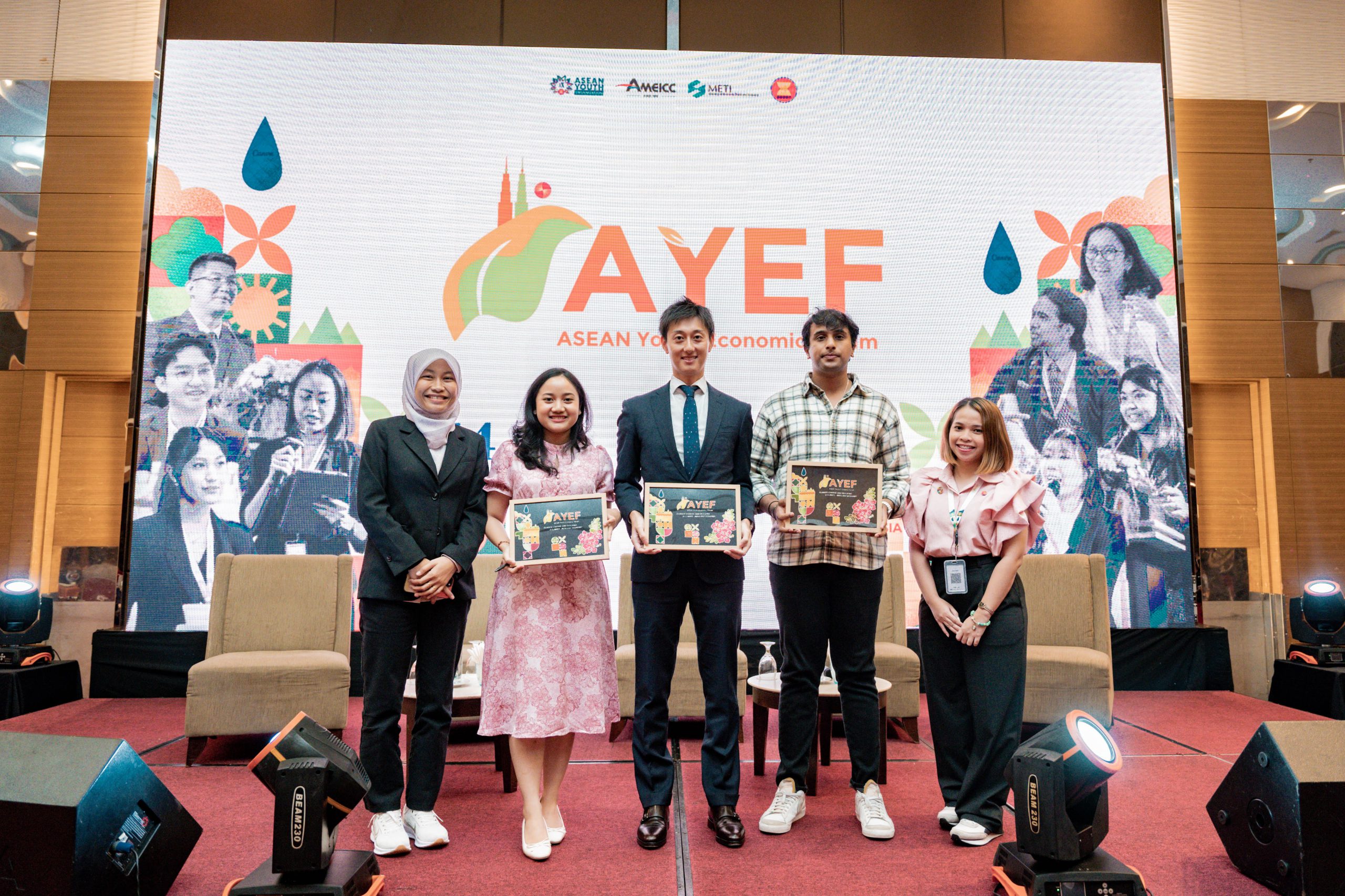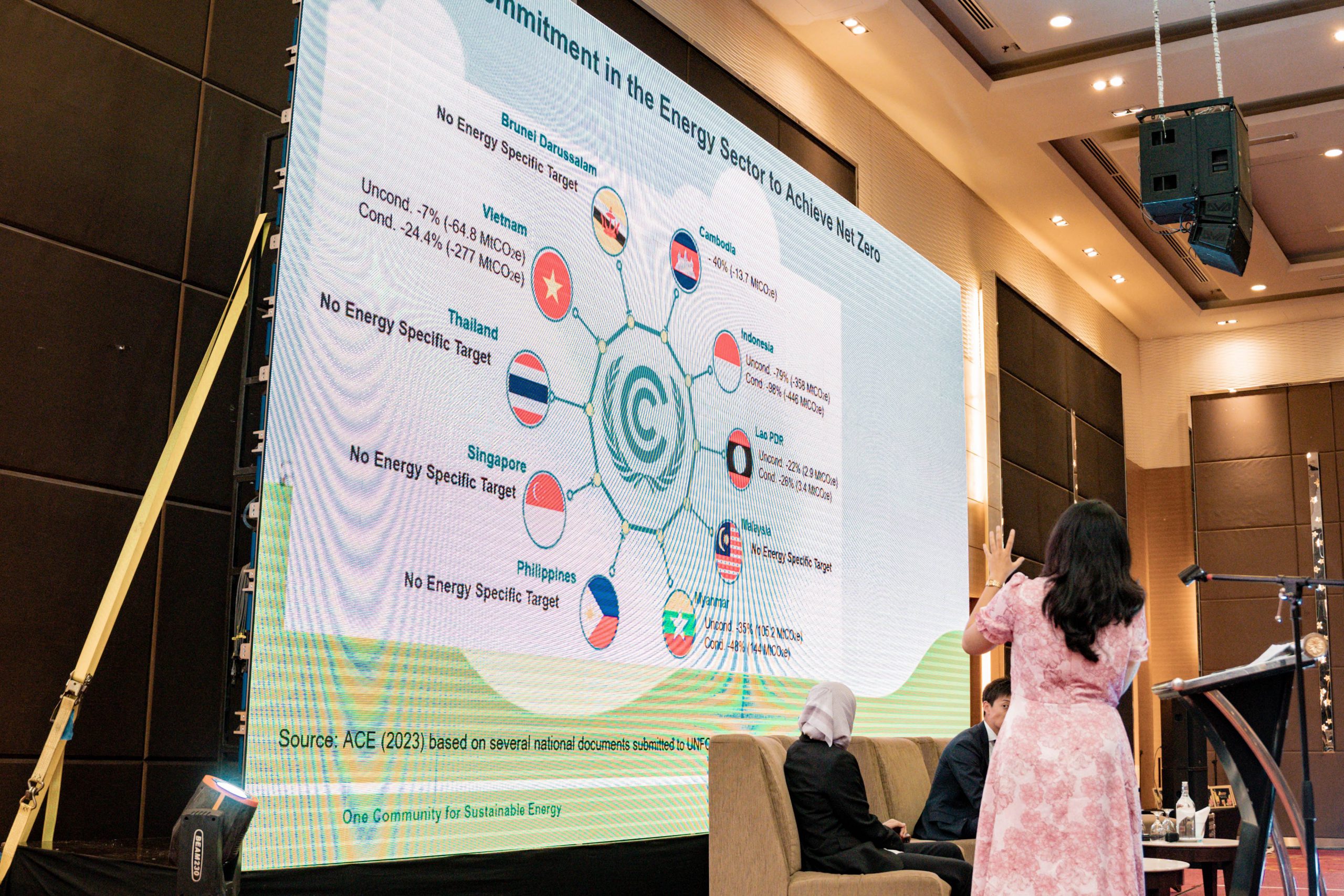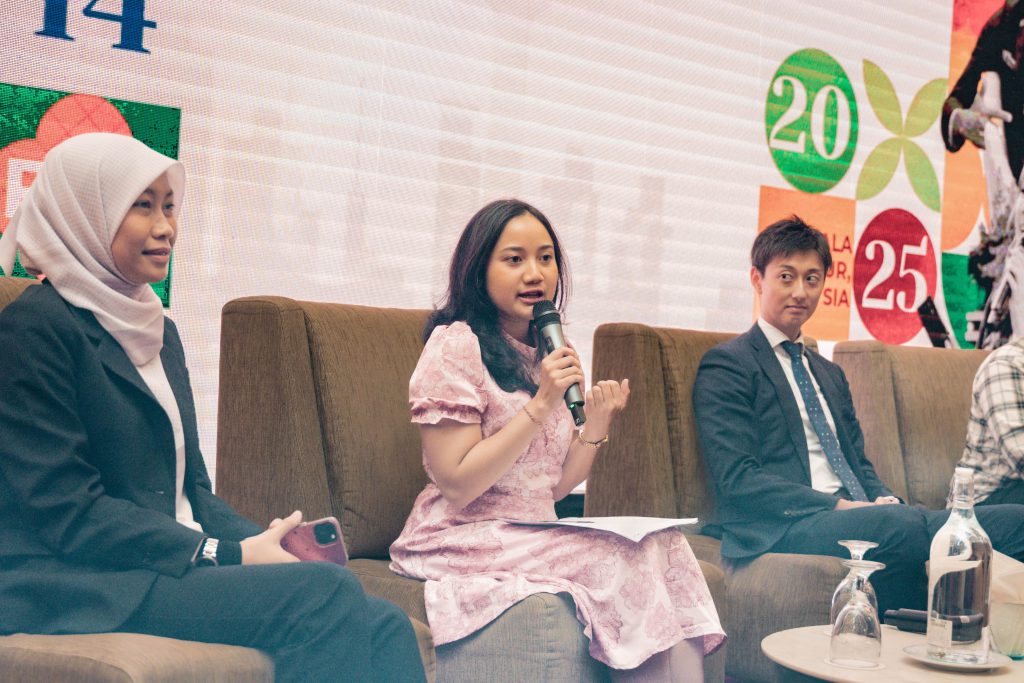Kuala Lumpur, 14 February 2025

Photo 1. (left to right) Ms Nur Syahira Syafika binti Azaman as Moderator; Ms Indira Pradnyaswari, Research Analyst of ACCEPT II; Mr Yuki Shinoda, Manager at Sumitomo Corporation Vietnam LLC; Mr Carlo Charles, Founder & CEO of Flint, and Ms Robi Kate Miranda, Project Director of AYEF 2025
The spirit of climate change mitigation and adaptation does not only recognize by experts, but also the young generation. Aligning with ASEAN’s Climate Action Plan, youth leadership is marked as one important aspect in driving climate resilience. Through the ASEAN Youth Economic Forum 2025 (AYEF 2025), young leaders are encouraged to promote sustainable growth, green technology, and economic resilience in regards of climate change. This year, the AYEF 2025 was organized in Kuala Lumpur, Malaysia with the theme “Climate Change and Building a Climate-Resilient Economy” on 14-16 February 2025.
The AYEF 2025 aims to strengthen ASEAN collaboration on climate resilience, empower youth to influence climate policy, advance sustainable infrastructure and innovation, and accelerate climate adaptation strategies. The event was participated by more than 150 ASEAN youth representatives, international organizations, industries, as well as academicians. The forum was divided into three sessions; the first session on “Mainstreaming Climate Resilience in Policy and Governance”; the second session on “Financing Low-Carbon and Resilient Infrastructure”; the third session on “Supporting Renewable Energy Expansion” and the last session on “Strengthening Disaster Risk Reduction (DRR) System.

Photo 2. Ms Indira Pradnyaswari is presenting on Session 3 “Supporting Renewable Energy Expansion”
On this occasion, the ASEAN Climate Change and Energy Project (ACCEPT) was invited to support the knowledge dissemination of climate-related efforts, especially in renewable energy and ASEAN Power Grid development on the third session. Moreover, the session highlighted ASEAN’s progress in renewable energy, focusing on cross-border initiatives such as ASEAN Power Grid and renewable energy deployment such as solar and bioenergy. Furthermore, the session addressed regulatory incentives, technology adoption, and regional energy markers within the region. The session was moderated by Ms Nur Syahira Syafika binti Azaman, Asst. Officer of International Youth Center Kuala Lumbur, where Ms Indira Pradnyaswari, Research Analyst of ACCEPT II was given the opportunity to present recent updates on ASEAN Nationally Determined Contribution (NDC) and the deployment of green technology in support to achieve a net zero future. As ACCEPT project presents a bold action towards energy and climate nexus, she delivered a combined perspective between APG implementation and its way forward to support the regional climate targets. She initially introduced the ASEAN Carbon Neutrality Strategy – underlining the regional plan and efforts to reduce carbon emission. The document stated that power sector contributes 35% greenhouse gas (GHG) emission generation, where it could be reduced by increasing renewable energy utilization, enhancing energy efficiency, as well as optimizing low emission technology, where interconnected grid is mentioned as one of the key points to curb carbon emission.

Photo 3. (left to right) Ms Nur Syahira Syafika binti Azaman; Ms Indira Pradnyaswari; and Mr Yuki Shinoda during the discussion session.
Ms Indira Pradnyaswari continues her material by showing the ASEAN Power Grid (APG) map in Southeast Asia. She also shared that the APG is a regional initiative to construct a regional power interconnection to connect the region, first on cross-border bilateral term and then gradually expand to a sub-regional basis and subsequently leading to a total integrated Southeast Asia Power Grid System. The project was started with the Lao-Thailand-Malaysia-Singapore (LTMS) power integration as the pathfinder of multilateral power trading in ASEAN context. The important part is, the LTMS has demonstrated that power trading among multiple ASEAN Member States is possible, and there is more potential to be expanded to include more countries. In regards with the ASEAN Chairmanship 2025, the APG has become one of the main focus, where the country reaffirmed its commitment to realise the APG by 2045 and encouraged efforts to accelerate the establishment of the APG to promote regional energy connectivity, security and resilience. Additionally, three current development priorities of APG were mentioned by Ms Indira, including the development of infrastructure, market, and regional institutions as the enabler of capacity development. Based on the ASEAN Interconnection Masterplan Study (AIMS) III, through APG, renewable energy share could be boosted significantly up to 59% of RE share in installed capacity by 2040.
On its contribution towards carbon emission reduction, the role of regional interconnection is also included in the 8th ASEAN Energy Outlook (AEO8) under the Carbon Neutrality Scenario. The scenario explores continued efforts and initiatives based on technological approach to reduce GHG emission as well as achieving the regional emission reduction target. As the way forward, the APG shall planned further technical planning and feasibility studies as well as financing plan to maintain the regional progress.
Mr Yuki Shinoda, Manager at Sumitomo Corporation Vietnam LLC, who is also in the same session explained more on the role of renewable energy in fosterin a climate resilient economy across ASEAN, with a focus on Vietnam and the Mekong region. He shared strategies to accelerate investment in renewable energy infrastructure, including rooftop solar, floating solar, and wind power to mitigate climate change impacts. Moreover, the challenges and opportunities in maintaining the electricity markets and promoting renewable energy adoption in emerging ASEAN economies were also discussed during the session. Mr Shinoda also emphasized the importance of cross-sector collaboration, including public-private partnership to enhance the regional climate resilience through clean energy innovation.
On the technological perspective, Mr Carlo Charles, Founder & CEO of Flint, a battery-based company in Singapore, presented on his recent innovation. As the Head of Product & Innovation at Flint, he introduced the development of the world’s first commercially viable paper battery technology that eliminated the need for Lithium, Nickel, or Cobalt as the main material of battery. He also gave his perspective about the critical role of energy storage in supporting renewable energy integration and grid stability, as well as reducing reliance on toxic materials added during the production stage. In his closing statement, he also holds the vision to inspire youth movement in driving more engineering and climate solutions for a sustainable energy future.
Moving forward, ACCEPT will continuously collaborate, engage, and advocate climate-energy related matters in shaping a low carbon energy in ASEAN region. Through a combined perspective between government, research institutions, industries, and public participation, the big picture of net zero future shall be pursued progressively.
**
(IP)
Join our ASEAN Researchers Network on Climate Change (ARNECC) by registering yourself here. Become a part of our collaborative efforts to address pressing climate challenges and shape a sustainable future.
Detailed information on ACCEPT II can be found at https://accept.aseanenergy.org/
Follow our social media to get the latest updates on ACCEPT activities and ASEAN energy-climate information:
Instagram: instagram.com/asean_accept
X: x.com/asean_accept
We welcome any future collaboration, please feel free to contact us at [email protected]